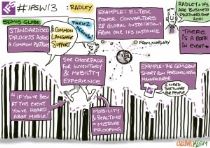This is one of a series of live blog posts directly from the site of the 2013 IFS World Conference in Barcelona. Business journalist Adam Tinworth is a veteran of Reed Business Information and a lecturer on digital journalism at City University in London. His first-hand impressions are accompanied by illustrations of Matthew Buck, cartoonist for Drawnalism.
 The best way to understand how Radley’s integration with IFS works is to hear stories of it in use. Four customers will be giving their story through the course of this session.
The best way to understand how Radley’s integration with IFS works is to hear stories of it in use. Four customers will be giving their story through the course of this session.
Brett Koehn, Bemis Manufacturing.
Bemis is a 110-year old family owned plastics moulder. They produce products and do contracted mouldings. They have 1,600 employees in six countries – and they’re the largest toilet seat manufacturer in the world. The company’s being using IFS since 2005, and are currently on 7.5, and is running the UK & Mexico facilities. They’re targeting it for their distribution facility in Chile.
They chose the combined package because they wanted a barcoding solution to improve efficiency, and which worked as a single, common platform across their nations. It supports their multi-lingual needs well. They can also contain costs for future upgrades. They use it for pretty much any inventory-related activity. They have 8 or 9 customers in the UK that they’re using it to process in-bound customer orders.
The move to 7.5 was about eliminating customisations. Using Radley meant that they could go from 50 modifications to four – which were driver but links with other software. They’re no replacing regional systems with global ones.
Alex Ivkovic, CDF Corporation and Cheer Pack North America
CDF produces plastic containers and packaging. They’re pioneers in green sustainable packages. They’ve been using IFS since 2007, and are now on 8 with SP1. They have 3 factories in south east Massachusetts.
The Cheer Pack plant drove the need for a barcode system, because of their use in baby foods. Tracking levels have to be high in case of recall. This is a three year old division that’s growing rapidly. They implemented in 2011, across two divisions. They brought in Radley engineers to consult, and they did a really good job of indetifying the exact needs of the company.
Integration between the Radley apps and the mobile apps is going very well – they’re using iPods to do this. Radley is developing transactions that allow compound transactions to happen in one move – combining two simple processes into a single action, which minimises mistakes. Finished goods container labels are printed automatically across the plant. That stops mistakes – and speeds the information into IFS Applications.
Muna Taarland, ELTEK
ELTEK is a Norwegian company, a world leader in high-efficiency power conversion and electronics. It’s over 40 years old, and has products which helps companies save money and reduce environmental impact by efficiently converting power supplies into the forms needed for specific purposes. They’re in the middle of upgrading to IFS Applications 8. They have offices in 30 countries, but serve 100 countries, with 2400 employees. They approached Radley in 2008, because a consumer required invoicing through EDI.
Last year, they won a contract to produce charges for Volvo’s new electric vehicle project – but they sold that business to a bigger company with more experience. They implemented iR*EDI and iCARaS with full IFS integration. The whole process is handled from order creation to invoicing. It stops people having to login directly to EDI – and is helping them win new business. This was just a technical upgrade – the IFS Applications 8 project will see process improvement, too.
Jonathan Isaacson, The Gem Group
The Gem Group provides personalised bags and business accessories. They have 20,00o customers, and they don’t hold stock. They’re all small orders, in and out in a few days. %0 years in business, 500 employees. They’re on track to upgrade to Applications 8 next year. They first implemented IFS in the beginning in 2008. Before then it was all manual – bits o paper everywhere. People didn’t trust the system – they were constantly rechecking. They wanted to automate everywhere. And they needed software designed for ordinary people, that was easy and mistake-proof.
They put in hand-held readers, and implemented it everywhere from the warehouse to the sample room. Everything is handled in real time, allowing the streamlining of the shipping systems. Sample orders are now an automated process.
There were a bunch of benefits. They no longer do an end of year inventory. They’re saving 5.5 hours per day in the sample picking process. They’re migrating to IFS Applications 8 – and moving the Radley solution is on time and under budget – how often do you hear that?
Сialis
Do you mind if I quote a few of your posts as long as I provide credit and sources back to your webpage?
My blog site is in the exact same niche as yours and my visitors
would definitely benefit from a lot of the information you provide here.
Please let me know if this okay with you. Thanks a lot!